|
Learn To Dive with Prima 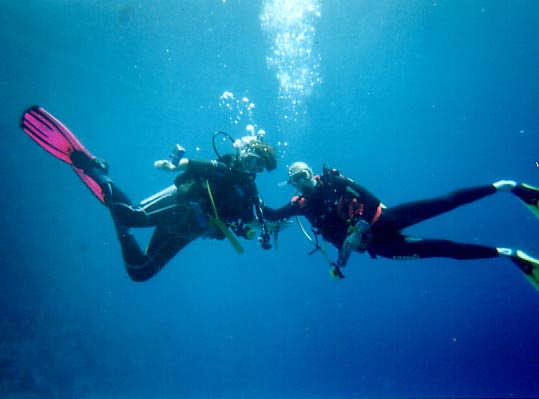 How can I join Prima Sub Aqua? Contact the Membership Secretary for full current details You can also contact any of the committee for details of joining, or you can approach us at Cheslyn Hay Leisure Centre pool or "The White Hiorse" on Tuesday evenings. We will arrange a try dive for you if you have never dived before. If you are a qualified diver we will be more than happy to welcome you to the club and discuss the benefits of membership. 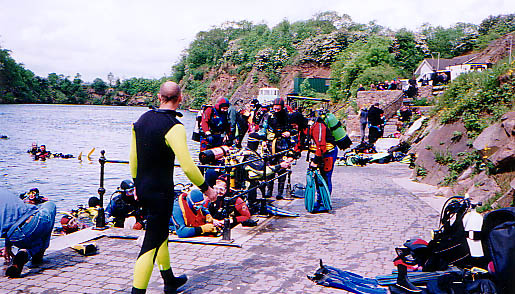 A
busy day at Stoney Cove
A
busy day at Stoney Cove
How fit should I be? You need to be able to swim and be reasonably fit. To become a member of the club and BSAC you will need to fill out a medical 'self-cert' form; or if you have answered yes to any of the medical questions, you will need to have a medical with a qualified doctor; for which you will have to pay a small fee. What does a Try Dive involve? One of our qualified members will go through the basics of scuba, with an introduction to the scuba kit and how it works. You will then try on the kit and get into the shallow end of the pool for a short lesson with your instructor – if you enjoy the experience of weightlessness and the ability to breathe under water and can’t wait to learn more, then talk to us about membership. What is BSAC? 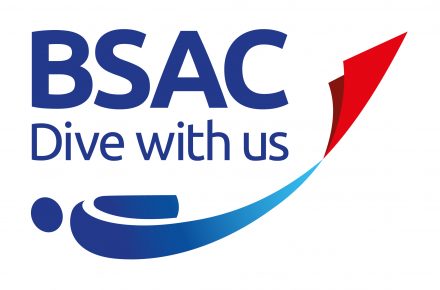 BSAC is the British Sub Aqua Club. As a member of Prima, you automatically join BSAC, the biggest dive club in the world. The difference between BSAC and PADI is that with BSAC you join a club environment and train at a pace that suits you. You are led through the various stages of training and go on dive trips that the club organises PADI is a commercial training qualification. Both qualifications are universally recognised. Your PADI qualifications are recognised by BSAC. For further details on BSAC go to http://www.bsac.com 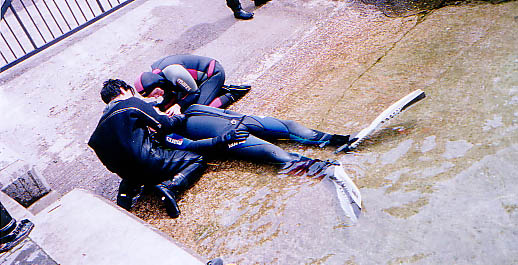 Practice
your rescue skills with our trained instructors
Practice
your rescue skills with our trained instructors
How much does it cost? Our dive fees are according to your age. We know that you’ll find our fees excellent value compared to other dive courses. The beauty of becoming a member is that the more you learn, the more you save. Our fees include membership of BSAC, free subscription to DIVE Magazine, lectures, training and course material. Compared with P.A.D.I. who charge £250 - £400 to teach you to the same qualification level. All training with Prima is included in your membership fees (NO HIDDEN EXTRAS) unlike P.A.D.I. who charge extra for a multitude of skill training programs For New Divers 2024 (reduction for abated members)
Renewal For Existing Members 2024
Discounts
for existing members for prompt payment & length of service
What does training involve? Training takes place during our club nights on Tuesdays at the Cheslyn Hay Leisure Centre. Standards are high and we feel this is reflected in our excellent safety record. Abilities and confidence levels vary between students and our instructors have considerable experience in recognising this and tailoring pool training to suit. If it takes 3 weeks to complete a module we do not mind as long as the student is competent at the end of the module compared with P.A.D.I. who require you to complete a level within a specified time. Where confidence and ability is high the student will move quickly through the modules. The BSAC has been training people to dive since the early fifties. The programme is designed to build confidence and self-reliance, whilst keeping safety uppermost. Lectures are more rigidly structured to enable efficient use of instructors. New courses commence on a regular basis. Diving skills are taught progressively so that each new experience is built upon step by step. Following basic training in the safety of a swimming pool or protected area, students soon complete their first open water dives to achieve Ocean Diver certification. This progression continues to Sports Diver and beyond, where open water skills and techniques are further developed and experience gained. Open water training takes place at our local quarries Dosthill and Stoney Cove. Additionally, most BSAC skill development courses such as Boat Handling, Practical Rescue Management and Oxygen Administration can also be taught in-house. And Equipment? The club will loan equipment to you throughout your training. We recommend that you purchase the minimum of a mask, fins and snorkel to begin with, and your own weight belt together with weights when you begin open water diving. You can buy or hire the rest, but will gradually buy most of the essential kit over the first year or two. Buying new can be expensive, A full set of new equipment may cost in excess of £1000. Fortunately there are a number of options to help you. There are always dive members willing to sell off second hand gear as they "trade up". Some shops offer excellent deals and interest free credit. There are a few shops around plus the internet, prices are reducing slowly and vary considerably so shop around, due to competition some great bargains can be found. Members love to tell others where they got a good deal. Crossing over from another diving organisation: The BSAC system for recognizing other diving qualifications is called SALT (Statement of Alternative Training). Qualifications from other agencies can be mapped across to their nearest equivalent BSAC qualification and, on joining the Club, the diver's BSAC Qualification Record Book is issued with a sticker over that qualification showing that the diver had completed the training with another agency. As part of the crossover process, the diver will also be required to attend a lesson giving details of the BSAC and how it works along with an overview of the BSAC '88 Decompression Tables. The diver can then continue to train and dive as though they held the equivalent BSAC qualification. The equivalent qualifications are as follows:
Do you have to be a good swimmer? Not necessarily. This may come as a surprise but confidence in the water is more important than your ability to swim long distances. You will need to be able to comfortably swim 4 lengths of the pool and tread water for a few minutes. You'll find that diving is actually easier than swimming, because there's no need to raise your head out of the water to get each breath. Is it difficult to learn? Not for most people, through a well established and relaxed training curriculum, you will steadily develop your diving skills and knowledge. Initially, underwater skills are learnt in the pool and the theory in a classroom. The training is fun, easy, interactive and is geared towards learning by 'doing'. How long will it take to learn to dive? It depends, firstly on the commitment that you can give to learning and diving. Typically it takes about 10-15 weeks to achieve Ocean Diver, this is the basic diver qualification. This requires attendance at the weekly pool and theory lessons and the open water training days. Nowadays some people cannot attend this frequently and so it takes longer. Diving is one of those activities where you never stop learning. Can I wear contact lenses or glasses while diving? Soft contact lenses should not be a problem. Bring an extra pair or two, in case one washes out. Most modern masks can be fitted with your prescription lenses. What if I miss some lessons? Nowadays it is very difficult to attend all the training sessions, If you miss any, they will be fitted in wherever possible. Is it safe? Yes, The British Sub Aqua Club have developed their Safe Diving Practices and training programmes from many years of experience. They are designed to slowly build up skills, knowledge and develop safe diving attitudes. Diving is similar to driving a car, if you drive recklessly, i.e., drive on the wrong side, go through red lights etc. then you're heading for trouble. However if you stay within the general rules of the road, you'll be safe. The same applies to diving. To put this into perspective, it is safer than flying or driving and many other everyday sports. Incidents rarely occur and are usually related to ill considered risk taking. Prima Sub Aqua Club place a great emphasis on safe diving practice and has an excellent safety record.
Still Not Sure, why not have a go?
the Training Officer
to arrange a Try Dive.
© 2018 Prima Sub-Aqua |
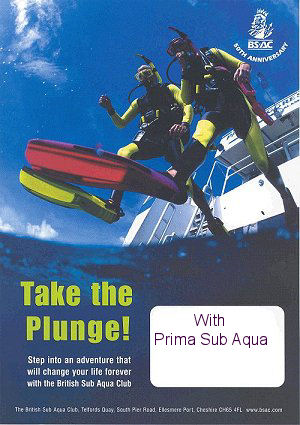 Contact
Contact